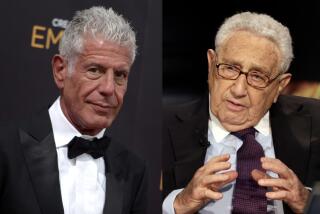WASHINGTON INSIGHT
- Share via
NO CROW IN THIS DIET: Scandals can be tough on the waistline--and the arteries. Just ask William H. Ginsburg, the attorney attempting to extricate former White House intern Monica S. Lewinsky from a presidential controversy. When he is not negotiating with independent counsel Kenneth W. Starr, Ginsburg is fielding restaurant invitations from Washington’s top-shelf dining spots. The eateries love to host Monica & Co. because of all the free publicity a visit drums up. Sam & Harry’s. Morton’s. The Palm. Name a Washington steak joint and chances are Lewinsky has strolled in the front door in recent weeks, flanked by her barristers and trailed by television crews. Legal Sea Foods got in on the action last week by faxing this invitation to Ginsburg: “We are worried that with all your visits to Washington, D.C.’s trophy steakhouses, you may be at risk for elevated cholesterol.” Ginsburg accepted. That night he, his co-counsel and his client ate seafood.
*
THOUGHTS OF CHAIRMAN JERRY: Former Gov. Edmund G. “Jerry” Brown Jr., now running for mayor of Oakland, has spent much of the 1990s castigating the Washington political establishment as out of touch and beholden to special interests. So why has Brown spent so much time recently with the Washington media pack, including a black-tie dinner of television correspondents? His heart may belong to Oakland, but his eyes seem to be on a national role. Judge for yourself:
On his next job: “I intend to be a voice for America’s cities. . . . Washington is a place of stagnation. The cities are places of innovation.”
On the Democratic Party, which he left earlier this month: “I don’t see the party of Kennedy and Johnson in it. . . . There’s not much democracy in either of the parties. The parties are about money. The parties are financially and intellectually bankrupt.”
On President Clinton’s troubles: ‘It’s part of an Oprahfication of contemporary politics. . . . It’s not a subject I choose to delve into.”
On reforming American politics: “What I’ve learned is that media politics is not a basis to govern, because there’s no basis for taking initiatives; it’s very reactive. I believe you have to create a structure of participation at the neighborhood level to offset the lobbyists.”
On himself at age 59: “I know more now--a lot more. . . . People think when I do different things, I’m changing. I’m not changing. The world is changing.”
On running for president in 2000: “No. That’s only two years away.”
On running for president in 2004: “You can only ask one election at a time.”
*
QUALITY TIME: What is it about the working for the Clinton administration that seizes people with a sudden desire for spouse and kids? After 15 months as Energy secretary, Federico Pena this week threw in the towel, saying he needed more time with his wife and three kids. That’s what he said in late 1996, too, when he wanted out of his job as Transportation secretary. The same exit line has been used by a long list of ex-administration worthies, including Treasury Secretary Lloyd Bentsen, Housing Secretary Henry G. Cisneros, Defense Secretary William J. Perry, Labor Secretary Robert B. Reich, National Economic Council Chief Laura D’Andrea Tyson, FDA Chief David A. Kessler, Deputy Atty. Gen. Jamie S. Gorelick, Asst. Atty. Gen. Deval Patrick, and White House Counsel Abner Mikva. Erskine Bowles used the explanation when he gave up his job as deputy staff chief in 1995; now he’s back as chief of staff--perhaps someday to use it again.
More to Read
Sign up for Essential California
The most important California stories and recommendations in your inbox every morning.
You may occasionally receive promotional content from the Los Angeles Times.













